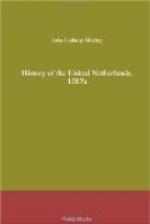The drums then beat, and proclamation went forth through the city that all burghers, without any distinction—municipal guards and all—were to repair forthwith to the city-hall, and deposit their arms. As the inhabitants arose from their slumbers, and sallied forth into the streets to inquire the cause of the disturbance, they soon discovered that they had, in some mysterious manner, been entrapped. Wild Irishmen, with uncouth garb, threatening gesture, and unintelligible jargon, stood gibbering at every corner, instead of the comfortable Flemish faces of the familiar burgher-guard. The chief burgomaster, sleeping heavily after Sir William’s hospitable banquet, aroused himself at last, and sent a militia-captain to inquire the cause of the unseasonable drum-beat and monstrous proclamation. Day was breaking as the trusty captain made his way to the scene of action. The wan light of a cold, drizzly January morning showed him the wide, stately square—with its leafless lime-trees and its tall many storied, gable-ended houses rising dim and spectral through the mist-filled to overflowing with troops, whose uniforms and banners resembled nothing that he remembered in Dutch and English regiments. Fires were lighted at various corners, kettles were boiling, and camp-followers and sutlers were crouching over them, half perished with cold—for it had been raining dismally all night—while burghers, with wives and children, startled from their dreams by the sudden reveillee, stood gaping about, with perplexed faces and despairing gestures. As he approached the town-house—one of those magnificent, many-towered, highly-decorated, municipal palaces of the Netherlands—he found troops all around it; troops guarding the main entrance, troops on the great external staircase leading to the front balcony, and officers, in yellow jerkin and black bandoleer, grouped in the balcony itself.
The Flemish captain stood bewildered, when suddenly the familiar form of Stanley detached itself from the central group and advanced towards him. Taking him by the hand with much urbanity, Sir William led the militia-man through two or three ranks of soldiers, and presented him to the strange officer on horseback
“Colonel Tassis,” said he, “I recommend to you a very particular friend of mine. Let me bespeak your best offices in his behalf.”
“Ah God!” cried the honest burgher, “Tassis! Tassis! Then are we indeed most miserably betrayed.”
Even the Spanish colonel who was of Flemish origin, was affected by the despair of the Netherlander.
“Let those look to the matter of treachery whom it concerns,” said he; “my business here is to serve the King, my master.”
“Render unto Caesar the things which are Caesar’s, and unto God the things which are God’s,” said Stanley, with piety.
The burgher-captain was then assured that no harm was intended to the city, but that it now belonged to his most Catholic Majesty of Spain— Colonel Stanley, to whom its custody had been entrusted, having freely and deliberately restored it to its lawful owner. He was then bid to go and fetch the burgomasters and magistrates.




